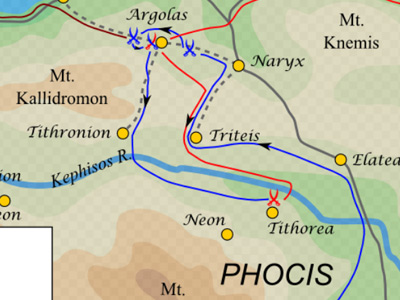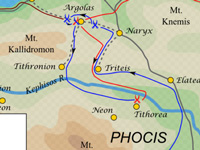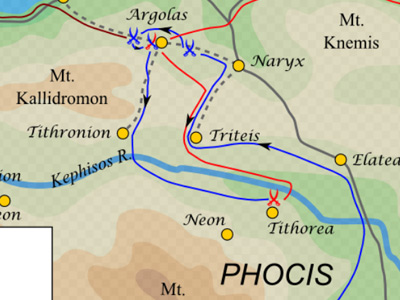Third Sacred War (356–346 BC)

Seizure of Delphi
On his return to Phocis, Philomelos began assembling a mercenary army using the 15 talents from Archidamos, and also raised a force of 1000 peltasts from amongst the Phocian citizenry. In approximately July 356 BC, Philomelos marched on Delphi, just before the end of the period in which the Phocians had been required to pay their fine. He easily captured the city of Delphi, along with the sanctuary of Apollo. Philomelos captured the nobles of the Thrakidai family, who had probably been involved in imposing the fine on Phocis, and killed them, seizing their wealth to add to his treasury. He promised the other Delphians that he would not harm them, although he had initially contemplated enslaving the whole city.
Ozolian Locrian expedition to Delphi
The news of Philomelos's move against Delphi resulted in a relief expedition being mounted by the Ozalian Locrians, probably mainly from Amphissa. Philomelos's army met the Locrians in open battle on a small plain between the city of Delphi and the sanctuary, and routed them with heavy losses. Some prisoners were taken, and Philomelos had them thrown from the cliffs that tower over the sanctuary (the Phaidriadai rocks). This was the traditional punishment for sacrilege against Apollo's temple, and through the means of this atrocity, Philomelos was asserting the Phocian claim to the presidency of the sanctuary. Buckler observes that "in his first acts, Philomelos set a brutal stamp on the war".
Fortification of Delphi
After defeating the Locrians, Philomelos continued to strengthen his position in Delphi. He destroyed the stones which recorded the verdict against the Phocians, and abolished the government of the city, installing in its place a group of pro-Phocian Delphians, who had been in exile in Athens. Philomelos ordered the sanctuary be fortified on the western side (natural features defended the other approaches), and a large limestone wall was constructed. He then demanded that the priestess of Apollo (the Pythia) provide him with an oracle; she replied that he "could do whatever he wanted". Philomelos called that an oracle, and had it inscribed in the sanctuary, as was customary. This pseudo-oracle provided Philomelos with supposed divine justification from Apollo for his actions. He next sent embassies to all Greek states, asserting the Phocian claim to Delphi, and promising not to touch the treasury of Apollo; Buckler suggests that he did not expect the Greeks to acquiesce to his actions, but hoped to draw support away from the Amphictyons. The Spartans, as expected, endorsed Philomelos's actions, since their fine was now erased, whilst Athens also expressed support, following their general anti-Theban policies.
Declaration of Sacred War
However, Philomelos's embassies elsewhere met with failure. The Locrians demanded that the Amphictyons avenge them and Apollo, and the Thebans sent embassies to the other council members suggesting that a sacred war should be declared against Phocis. This was assented to by most Greek states, including the Amphictyonic council members (minus Sparta and Athens), and those well-disposed to Thebes; furthermore, otherwise uninvolved states declared support for the Amphictyonic for reasons of piety. The Amphictyons seem to have decided that the year was too advanced to begin campaigning, and so agreed to launch military action the following year. They may have hoped that in the meantime, their sacrilegious behaviour would cause the Phocians to reconsider their position.
HISTORY

RESOURCES
This article uses material from the Wikipedia article "Third Sacred War (356–346 BC)", which is released under the Creative Commons Attribution-Share-Alike License 3.0.
© Stories Preschool. All Rights Reserved.









